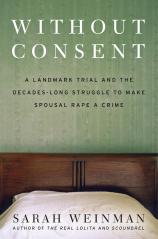Without Consent: A Landmark Trial and the Decades-Long Struggle to Make Spousal Rape a Crime
Review
Without Consent: A Landmark Trial and the Decades-Long Struggle to Make Spousal Rape a Crime
Having spent the greater part of my 50-year legal career in the criminal justice system, I can confidently say that WITHOUT CONSENT is a remarkable historical account of a criminal case that created a national sensation and led to debates on legal issues impacting the lives of women in America for centuries. Sarah Weinman is the Crime & Mystery columnist for the New York Times Book Review and publishes a newsletter, The Crime Lady, that covers both crime fiction and true crime.
Books examining significant trials are often noteworthy as the legal case itself is not the end of the discussion but only the beginning. One might think of SIMPLE JUSTICE by Richard Kluger, which tells the history of both Brown v. Board of Education and the Civil Rights era in our nation. A CIVIL ACTION is not simply the story of a single environmental case in Massachusetts. In the hands of Jonathan Harr, it becomes a book about the practice of law in America.
"WITHOUT CONSENT is a thoughtful and exhaustive discussion of a historical legal movement that changed law and gender politics. It also brings attention to the damaging and inherent misogyny of American culture that existed for centuries and sadly continues."
WITHOUT CONSENT is similar in scope and style to these exceptional works in its treatment of Oregon v. Rideout, a case that for a moment in time was hotly debated and aggressively reported but is now little remembered. Weinman begins with an examination of the lives of Greta and John Rideout before the morning when Greta would walk into a Salem, Oregon police station intending to file charges against her husband for rape.
The trial, which gained national attention, occupies only 32 pages of the 260-page book. After the trial, the Rideouts enjoyed a brief flash of celebrity, to a large degree because of their reconciliation. More importantly, Weinman chronicles how the aftermath of the case, through the work of many activists, brought change to criminal justice in almost every state in America.
In 1978, only four states recognized “marital rape” as a crime. The belief that a husband could not force his wife to have sexual relations was a link in a long historical chain of how women and marriage were viewed in society. This notion was not prevalent in just the United States. A husband could not be charged with the rape of his wife in England, Australia and most of Europe. That is even the case in many countries today.
It was not until the ’60s and ’70s when constitutional rights began to flow to women, and they could become independent of their husbands. As a result of this newly recognized freedom, the issue of marital rape reached the public. As Weinman notes in her introduction, a crucial irony was present here: “the belief and centuries-old legal precedent that a man can’t rape his wife is the very thing that means a man can, in fact, rape his wife and get away with it.”
WITHOUT CONSENT is a thoughtful and exhaustive discussion of a historical legal movement that changed law and gender politics. It also brings attention to the damaging and inherent misogyny of American culture that existed for centuries and sadly continues. Even as this book allows us to consider our history, there are many who would ignore that history and continue in the mistaken belief that wives are “property.”
Reviewed by Stuart Shiffman on November 14, 2025
Without Consent: A Landmark Trial and the Decades-Long Struggle to Make Spousal Rape a Crime
- Publication Date: November 11, 2025
- Genres: Nonfiction, True Crime
- Hardcover: 320 pages
- Publisher: Ecco
- ISBN-10: 0063279886
- ISBN-13: 9780063279889




